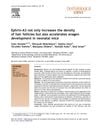 51 citations,
January 2003 in “Hormone Research in Paediatrics”
51 citations,
January 2003 in “Hormone Research in Paediatrics” Hormones and their receptors, especially androgens, play a key role in hair growth and disorders like baldness.
 47 citations,
October 2016 in “Molecular and Cellular Endocrinology”
47 citations,
October 2016 in “Molecular and Cellular Endocrinology” Androgens prevent hair growth by changing Wnt signals in cells.
 46 citations,
September 2010 in “Southern Medical Journal”
46 citations,
September 2010 in “Southern Medical Journal” Hair loss treatments include medications and new methods like low-level light therapy, which may work by boosting cell activity and blood flow.
 44 citations,
March 2004 in “Journal of Investigative Dermatology”
44 citations,
March 2004 in “Journal of Investigative Dermatology” The effects of estrogen on human hair growth are unclear and need more research.
 42 citations,
February 2017 in “Scientific Reports”
42 citations,
February 2017 in “Scientific Reports” Researchers found a way to create cells from stem cells that act like human cells important for hair growth and could be used for hair regeneration treatments.
 39 citations,
March 2009 in “Archives of Dermatological Research”
39 citations,
March 2009 in “Archives of Dermatological Research” Apigenin may help promote hair growth and could treat hair loss.
 34 citations,
May 2012 in “International Journal of Molecular Sciences”
34 citations,
May 2012 in “International Journal of Molecular Sciences” Dieckol from Ecklonia cava may help hair growth and could be a potential hair loss treatment.
 33 citations,
December 2008 in “Journal of Dermatology”
33 citations,
December 2008 in “Journal of Dermatology” Adenosine lotion improves hair growth and thickness in women with hair loss.
 25 citations,
September 2018 in “Molecular Biology of the Cell”
25 citations,
September 2018 in “Molecular Biology of the Cell” Blocking Wnt/β-catenin signaling with EGF receptor is necessary for proper hair growth.
 24 citations,
January 2015 in “Annals of Dermatology”
24 citations,
January 2015 in “Annals of Dermatology” Herbal extracts may help hair grow and could be an alternative to synthetic hair loss treatments.
 23 citations,
January 2020 in “Frontiers in Pharmacology”
23 citations,
January 2020 in “Frontiers in Pharmacology” Dihydrotestosterone affects hair growth by changing the Wnt/β-catenin pathway, with low levels helping and high levels hindering growth.
 22 citations,
November 2013 in “Clinical and experimental dermatology (Print)”
22 citations,
November 2013 in “Clinical and experimental dermatology (Print)” Ecklonia cava, a type of seaweed, may help hair grow.
 19 citations,
February 2008 in “Archives of Dermatological Research”
19 citations,
February 2008 in “Archives of Dermatological Research” Mast cells might contribute to hair loss by causing skin thickening.
 17 citations,
February 2019 in “PubMed”
17 citations,
February 2019 in “PubMed” Stem cells can help regenerate hair follicles.
 16 citations,
January 2016 in “Journal of Investigative Dermatology”
16 citations,
January 2016 in “Journal of Investigative Dermatology” Mice without the IL-6 gene had more hair growth after injury due to higher activity of a related protein, Stat3.
 15 citations,
May 2020 in “BMC complementary medicine and therapies”
15 citations,
May 2020 in “BMC complementary medicine and therapies” Polygonum multiflorum extract helps hair grow longer and fights the effects of hormones that cause hair loss.
 15 citations,
July 2008 in “Journal of Dermatological Science”
15 citations,
July 2008 in “Journal of Dermatological Science” Ephrin-A3 helps increase and speed up hair growth in baby mice.
 13 citations,
September 2018 in “Scientific Reports”
13 citations,
September 2018 in “Scientific Reports” The research found that a complex gene network, controlled by microRNAs, is important for hair growth in cashmere goats.
 13 citations,
September 2010 in “Journal of Dermatological Science”
13 citations,
September 2010 in “Journal of Dermatological Science” Researchers made a cell line that grows quickly and can help with hair growth research.
 12 citations,
May 2003 in “Journal of dermatological science”
12 citations,
May 2003 in “Journal of dermatological science” Hsc70 protein may influence hair growth by responding to androgens.
 11 citations,
January 2018 in “Acta dermato-venereologica”
11 citations,
January 2018 in “Acta dermato-venereologica” Researchers found specific genes in the part of hair follicles that could help treat hair disorders.
 10 citations,
August 2014 in “Experimental Dermatology”
10 citations,
August 2014 in “Experimental Dermatology” Decorin, a protein, may help start hair growth and could be used to treat hair loss.
 9 citations,
March 2009 in “European Journal of Dermatology”
9 citations,
March 2009 in “European Journal of Dermatology” Schisandra nigra extract may help hair grow by stimulating cells and preventing hair follicle damage.
 8 citations,
June 2019 in “Scientific Reports”
8 citations,
June 2019 in “Scientific Reports” Increased PPARGC1α relates to hair thinning in common baldness.
 8 citations,
May 2013 in “Journal of Investigative Dermatology”
8 citations,
May 2013 in “Journal of Investigative Dermatology” Different problems with hair stem cell renewal can lead to hair loss.
 6 citations,
November 2020 in “Molecular and Cellular Endocrinology”
6 citations,
November 2020 in “Molecular and Cellular Endocrinology” Androgens reduce BMP2, which weakens the ability of certain cells to help hair stem cells become different types of cells.
 5 citations,
July 2006 in “Contact dermatitis”
5 citations,
July 2006 in “Contact dermatitis” Ammonium bisulfite in hair bleach can cause facial eczema.
 3 citations,
April 2015 in “American journal of biomedical sciences”
3 citations,
April 2015 in “American journal of biomedical sciences” Androgens play a key role in hair growth and disorders like baldness and excessive hairiness.
 1 citations,
January 2014 in “Elsevier eBooks”
1 citations,
January 2014 in “Elsevier eBooks” Melanocytes produce melanin; their defects cause vitiligo and hair graying, with treatments available for vitiligo.
 1 citations,
January 2009 in “Drug delivery system”
1 citations,
January 2009 in “Drug delivery system” Anti-aging treatments like hair transplants, minoxidil, and finasteride effectively promote hair growth.






























